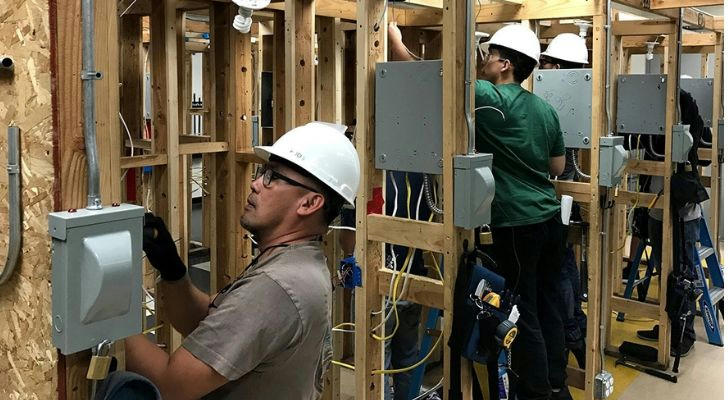Short-Term Electrician Training Programs in 2025
Electrician training programs with job placement services are gaining momentum in 2025, as more individuals seek hands-on skills that connect directly to employment. These programs offer a structured path into the skilled trades, combining technical education with career support from partnered employers and training providers.

🛠️ What Do Electrician Training Programs Include?
Most electrician training programs balance classroom learning with hands-on experience. Typical components include:
- Electrical theory and code compliance
- Circuit design and troubleshooting
- Blueprint reading and safety standards
- Low-voltage systems and wiring techniques
- Supervised lab work or job site practice
Training length varies widely—students can complete basic courses in as little as 4 weeks. Many programs are tailored to meet state requirements for electrical apprenticeships or certification.
🤝 Job Placement Support: How It Works
Some training providers collaborate with local contractors, utility companies, and construction firms to assist graduates in securing entry-level positions or apprenticeships. Common job placement features include:
- Employer partnerships that prioritize program graduates
- On-site career events or recruiter connections
- Post-graduation interview coaching and resume support
- Direct referral pipelines into electrical firms
While not all programs guarantee employment, those with embedded placement services often track hiring rates and maintain industry relationships to support student outcomes.
💼 Short-Term Electrician Programs with Job Support (2025)
| Provider | Format | Features | Duration |
|---|---|---|---|
| Goodwill | In-person | Prepares participants for employment as certified Electrical Trainees | 4 weeks |
| UsCareerInstitute | Online | No set class schedules; focus on real-world skills | 2–4 months |
| Penn Foster Career School | Online | Flexible and self-paced | 7 months |
| Clark State College | In-person | Entry-level prep for technician roles | 16 weeks |
| Ashworth College | Online | Designed for quick workforce entry; industry-recognized skills | 9 months |
💳 Financial Support Options for Electrician Training
Many 2025 electrician training programs offer financial support to reduce upfront costs. Common options include:
- Tuition Payment Plans: Most schools allow installment payments (often interest-free) with an initial deposit and weekly/monthly schedules.
- Employer Sponsorships: Some centers partner with contractors to cover partial tuition in exchange for post-graduation work commitments.
- Workforce Development Funds (Private): Nonprofit or industry-sponsored programs may fund high-demand trade skills, including electrical training.
- Education Lending Partners: Private lenders offer low-monthly-payment loans, with repayment starting post-employment.
- Tool Scholarships/Discounts: Partial reimbursement, lending kits, or discounted tool purchases for enrolled students.
- Referral/Early Signup Incentives: Tuition reductions for early registration or successful referrals.
Review a school’s financial options directly during admissions—reputable programs often assign financial advisors to help compare plans.
📈 Career Outlook for Electricians in 2025
Demand for qualified electricians remains strong in 2025, driven by construction projects, energy upgrades, and infrastructure development. Key trends:
- Average entry-level salary: $48,000–$58,000 annually
- Growth areas: Solar installations, smart home wiring, commercial retrofitting
- Certification advantage: Journeyman or Master Electrician licenses boost job access and earnings.
Job-connected training graduates may enter paid apprenticeships or technician roles faster.
🧭 How to Choose the Right Program
Evaluate programs based on:
- State licensing board recognition
- Lab hours or real-world wiring practice
- Employer partnerships/apprenticeship access
- Exam preparation support for required licensure
- Student testimonials and graduate placement rates
Align program format (online/in-person/hybrid) with personal goals and industry needs for long-term success.
❓ Frequently Asked Questions
Q: Can someone get hired after short-term training?
A: Yes. Many employers hire entry-level workers for assistant/helper roles if they complete hands-on basics and safety training.
Q: Is this training enough for a license?
A: These programs typically don’t meet full licensing requirements but may fulfill initial hours for official apprenticeships or job-based pathways.
Q: What if practical experience is required?
A: Most short programs include lab hours or simulate real-world scenarios to build confidence before job site work.
Q: Are evening/weekend formats available?
A: Yes. Some providers offer evening/weekend classes for those transitioning jobs or balancing family obligations.
